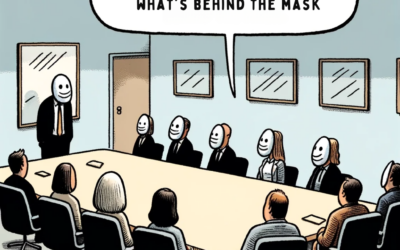As an executive coach, I am often hired by people who want me to fix them. It’s not that they feel broken; it’s that they don’t feel full and complete. They think, “If only…” Or they feel not ______ enough. That blank is filled in with words like good, smart, talented, knowledgeable, young, old, savvy, fit, strong, or pretty/handsome.
Bear in mind, these people are leading organizations and have lists of accomplishments a mile long. You wouldn’t confuse them with Stuart Smalley—the caricature of self-help neediness that Al Franken played on Saturday Night Live, whose mantra was “I’m Good Enough, I’m Smart Enough, and, Doggone It, People Like Me!”
And yet, like Stuart Smalley, these leaders are seeking acceptance—from others and themselves.So what’s preventing them from feeling accepted and accepting themselves? Why don’t they feel full and complete?
Well, for one thing, high achievers often choose to focus on what they haven’t done or attained, not on what they’ve already accomplished. It’s natural for them to raise the bar themselves, even if others haven’t done that for them.
Leaders may also suffer from what Freud calls the “Narcissism of Small Differences”: a narcissism driven by envy or the need to differentiate oneself. With this form of narcissism, people become too fixed on what distinguishes them, positively and negatively, rather than appreciating what they share with others. They feel their place and people are elsewhere. In the case of leaders, they often have their eye on a more elite circle.
When they get into these elite circles, however, they don’t always feel satisfaction. I know. I’ve had the privilege in being part of some of elite circles, like TEC, Harvard Business School, and the Aspen Institute. Each was an absolute treat and growth experience. I had to pinch myself as others’ recounted stories and shared wisdom, but I rarely felt satisfied. More often, I felt lonely. I felt I had to compare myself to others, and too often I felt I didn’t measure up. I felt less than and not enough.
The “not enough” feeling can be a combination of narcissism and vulnerability, as Brene Brown points out in her book Daring Greatly. “When I look at the narcissism through the vulnerability lens,” she writes, “I see the shame-based fear of being ordinary.”
Leaders aren’t ordinary. They’re unique, and it’s my job to help them develop pride in their strengths and accomplishments. Acceptance of oneself should not be construed an admission of failure. It’s a way to take greater satisfaction from work done and to make better decisions about what to do and where to go next.
If you feel “not ______ enough,” seeking entry into a more elite circle isn’t necessarily going to make you feel full and complete. There’s a reason why Groucho Marx’s line, “I would never join a club that would have me as a member,” is so often recited. Without self-acceptance, any form of external acceptance feels suspect.
Work on feeling full and complete, and then make plans for what to do, where to go, and what group to join next. Work on self-acceptance and understanding. And remember to exhale (it works miracles)




